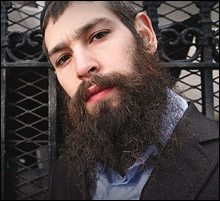Matisyahu and Madonna embrace a holy plan
3/2/2006 9:20:19 AM
follow link for the rest of it..Madonna shouldn’t be singled out for her mystical awakening into the cult of the red bracelet when Bono is busy debating religious relativism with the president of the United States. But the fact that you can hear her Jewphilia on a pop station and then flip to alt-rock radio and hear Lubavitch Hasidism’s first Billboard-charting superstar, Matisyahu, demanding “Mosiach now!” on his “King Without a Crown” begs a larger question: how has Judaism become the new Christianity?
On “Roots in Stereo,” a duet between Matisyahu and Christian rap-rockers P.O.D. on the metal band’s latest Atlantic release, Testify, there doesn’t seem to be any difference between the two religions. In the song’s spliffy rude-boy blur where we’re all “the blood of God’s veins,” Jewish redemption and Christian redemption turn out to be the same thing after all.
Not that anyone seems to be listening too closely to what Matisyahu — once a Phish-following burnout named Matthew Miller who traded in his white-boy dreads for ultra-Orthodox Judaism — has been singing about. (Or for that matter, whether he’s even been on key.) He’s a Hasid on the mike! A black hat down for the boom bip! Just check the come-one-come-all circus-freak headlines: “Rebbe Rudeboy,” “Where Peter Tosh Meets Mazel Tov,” and of course, Stuff’s call to “check his circumcised rhymes.”
 Matisyahu’s novelty has overshadowed the fact that this “next-big-thing” is a convert to a hard-line, messianic branch of Judaism committed to strict interpretations of Jewish ritual and law. Lubavitcher Hasidim have their roots in late 18th-century Russia but have made the most noise in 20th-century Brooklyn under the leadership of their late rebbe Menachem Mendel Schneersohn (who many of them believe is the Messiah, due back on earth any day now). Matisyahu’s brethren aren’t just devout believers, though, they’re devout spiritual enforcers, best known for their aggressive attempts to get non-Orthodox Jews to come back to the fold and re-discover “real” Judaism. The pope has a car, the Lubavitch have vans: “Mitzvah mobiles.”
Matisyahu’s novelty has overshadowed the fact that this “next-big-thing” is a convert to a hard-line, messianic branch of Judaism committed to strict interpretations of Jewish ritual and law. Lubavitcher Hasidim have their roots in late 18th-century Russia but have made the most noise in 20th-century Brooklyn under the leadership of their late rebbe Menachem Mendel Schneersohn (who many of them believe is the Messiah, due back on earth any day now). Matisyahu’s brethren aren’t just devout believers, though, they’re devout spiritual enforcers, best known for their aggressive attempts to get non-Orthodox Jews to come back to the fold and re-discover “real” Judaism. The pope has a car, the Lubavitch have vans: “Mitzvah mobiles.”
On Youth, Matisyahu’s eagerly awaited third album (out this Tuesday on Epic), there’s no listing of Orthodox law, no Sabbath candle-lighting checklist. But it is most certainly a product of someone who believes God, or G-d, is everywhere and ready to intervene. Bathed in surprisingly hollow production from Bill Laswell, Youth is loaded with standard born-again, Orthodox speak: man is weak, “the reflection of imperfection” and in need of God’s help; substance abuse should be avoided (i.e., “treyf wine clouds the heart”), and “God’s wisdom [is] revealed in a holy plan.”
Matisyahu’s religious symbology on Youth can be as fuzzy as on the P.O.D. duet. He drops enough Mount Zion and Lion of Judah references here to keep the Rastas happy. But mostly he credits “Hashem,” Orthodox Jews’ preferred God alias, with bailing him out of a life of impurity. “If you’re drowning in the waters and you can’t stay afloat/Ask Hashem for mercy and he’ll throw you a rope,” he sings on “King Without a Crown.” The tone-challenged, quick-quick-slow ragga chatter and fake Jamaican accent make him sound like a 311 understudy, a constant reminder that beneath the beard lurks another white boy with a Rasta fetish. That’s not to say he doesn’t catch some choice beat waves or that “Indestructible” won’t get your head-nodding or that he’s not bringing uplift and positivity to anyone who’s looking to change their lives.
But what I hear on Youth is one thing we don’t need any more of right now: religious fundamentalism, even if it comes with catchy pop hooks. Contrary to Bono’s prayer-breakfast plea, the issue is not whose God, or whose religion, or how that religion is used by governments and terrorists. The issue is the ever-growing pull of religion and faith itself — how powerful beliefs in the unknown get lived as real and, in the worst cases, get turned into civic, social, and political policy.
Maybe all of Madonna’s music-video phylacteries and dance-floor Torah tales were her way of alerting us to the Matisyahu era to come. In politics, it’s the God you pray to that matters most; in pop music, it’s the quality of the pose — any God will do as long as you pretend to pray to something. For the secular among us, neither is a particularly appealing option.

2 Comments:
ferragamo belt
fila
custom baseball jerseys
longchamp bags
john wall shoes
converse shoes
coach outlet store
jordan retro
huarache shoes
lacoste polo shirts
hermes bags
balenciaga shoes
ultra boost
goyard bags
nmd
louboutin outlet
balenciaga shoes
nike jordans
michael kors uk
nike epic react
Post a Comment
<< Home